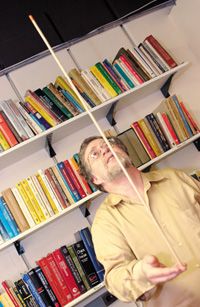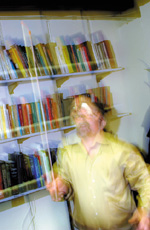John Milton —
Poise and Noise
Deep in the Albert Merritt
Billings building associate professor of neurology John
Milton steps side to side as he balances a wooden dowel
upright on his fingertip. “I’m getting pretty
good at this,” he exclaims.
 Milton
isn’t clowning around during a break from directing
the Hospitals’ Epilepsy Center, where he performs
implants of vagal nerve stimulators in severely affected
patients. He’s demonstrating his unexpected discovery
about the body’s nervous system: it generates random
“noise” to handle tasks—like balancing
a dowel or standing still without falling—that require
response in less time than it takes for a signal to travel
to the brain and back (100–200 milliseconds for the
stick, 250–500 milliseconds for standing). “If
the nervous system can only make a correction every 200
milliseconds,” he asks, “what’s it doing
the other 199?”
Milton
isn’t clowning around during a break from directing
the Hospitals’ Epilepsy Center, where he performs
implants of vagal nerve stimulators in severely affected
patients. He’s demonstrating his unexpected discovery
about the body’s nervous system: it generates random
“noise” to handle tasks—like balancing
a dowel or standing still without falling—that require
response in less time than it takes for a signal to travel
to the brain and back (100–200 milliseconds for the
stick, 250–500 milliseconds for standing). “If
the nervous system can only make a correction every 200
milliseconds,” he asks, “what’s it doing
the other 199?”
“Flipping coins.”
In a 2002 Physical Review
Letters study, Milton and Juan Cabrera, a physicist in Venezuela,
filmed a dozen people balancing the two-and-a-half-foot-long
dowel, measured the size of its wobbles, and then correlated
them with subjects’ hand movements to keep it upright.
About 98 percent of the movements occurred in less than
100 milliseconds. “That tells us something uncontrolled
by the nervous system is at work,” says Milton. He
calls that something “noise.” “The hand
makes little errors in its position. It should move a certain
time in a certain direction, but it doesn’t get it
exactly right.” The difference between where the fingertip
should move and where it goes is measured as noise. And
the errors, he notes, actually seem to help: the stick stays
balanced only if it is on the verge of toppling over.
 Milton
isn’t sure why the errors help or how noise works—at
this point, his observations exist only as a mathematical
formula. But his finding is making neuroscientists rethink
their ideas about motor control. Next he’ll research
“how you get better” at tasks that require quick
but precise reflexes. His focus will be the golf swing—something
Milton, with a handicap of 6, is already pretty good at.
Milton
isn’t sure why the errors help or how noise works—at
this point, his observations exist only as a mathematical
formula. But his finding is making neuroscientists rethink
their ideas about motor control. Next he’ll research
“how you get better” at tasks that require quick
but precise reflexes. His focus will be the golf swing—something
Milton, with a handicap of 6, is already pretty good at.
—S.A.S.
Select an expert:
Riccardo Levi-Setti - Trilobites
Richard Epstein - Parking
and Property
Mary Anne Case - Toilet
Inequities
Roman Weil - Vintage
Wine
Robert Grant - Sunken Submarines
David Galenson - Poetic
Values
John Milton - Poise
and Noise


![]() Advertising
Advertising
![]() About
the Magazine
About
the Magazine ![]() Alumni
Alumni
![]() UChicago
UChicago
![]()
![]() ©2003 The University
of Chicago® Magazine
©2003 The University
of Chicago® Magazine ![]() 5801 South Ellis Ave., Chicago, IL 60637
5801 South Ellis Ave., Chicago, IL 60637![]() fax: 773/702-0495
fax: 773/702-0495 ![]() uchicago-magazine@uchicago.edu
uchicago-magazine@uchicago.edu Milton
isn’t clowning around during a break from directing
the Hospitals’ Epilepsy Center, where he performs
implants of vagal nerve stimulators in severely affected
patients. He’s demonstrating his unexpected discovery
about the body’s nervous system: it generates random
“noise” to handle tasks—like balancing
a dowel or standing still without falling—that require
response in less time than it takes for a signal to travel
to the brain and back (100–200 milliseconds for the
stick, 250–500 milliseconds for standing). “If
the nervous system can only make a correction every 200
milliseconds,” he asks, “what’s it doing
the other 199?”
Milton
isn’t clowning around during a break from directing
the Hospitals’ Epilepsy Center, where he performs
implants of vagal nerve stimulators in severely affected
patients. He’s demonstrating his unexpected discovery
about the body’s nervous system: it generates random
“noise” to handle tasks—like balancing
a dowel or standing still without falling—that require
response in less time than it takes for a signal to travel
to the brain and back (100–200 milliseconds for the
stick, 250–500 milliseconds for standing). “If
the nervous system can only make a correction every 200
milliseconds,” he asks, “what’s it doing
the other 199?” Milton
isn’t sure why the errors help or how noise works—at
this point, his observations exist only as a mathematical
formula. But his finding is making neuroscientists rethink
their ideas about motor control. Next he’ll research
“how you get better” at tasks that require quick
but precise reflexes. His focus will be the golf swing—something
Milton, with a handicap of 6, is already pretty good at.
Milton
isn’t sure why the errors help or how noise works—at
this point, his observations exist only as a mathematical
formula. But his finding is making neuroscientists rethink
their ideas about motor control. Next he’ll research
“how you get better” at tasks that require quick
but precise reflexes. His focus will be the golf swing—something
Milton, with a handicap of 6, is already pretty good at.